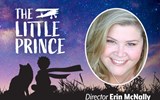By Brian Robin
Director Sees Stars, Memories with "The Little Prince"
Every time Erin McNally looks up at the sky, she finds the brightest star she can. That’s when the conversation begins. And the topic often comes back to one of the foundational books of her childhood.
“The Little Prince was one of my favorite books growing up,” she said. “The story itself, I look at it as it’s love. It talks about symbolism and other things. My brother passed away and we used to read that book together. That book ended up being so precious to me because it talks so much about what it is to truly have a relationship. It talks about loss and about what that really means.
“Because of The Little Prince, I pick the brightest star in the sky and that (becomes) my brother. I talk to him. It gives me that comfort. It always meant something to me. When I was given this chance, it was very important to me that the kids do something that is just as deep and magical as they are.”
Enter the stage adaptation of The Little Prince by Rick Cummins and John Scoullar, based on the book by Antoine de Saint-Exupery to the Nicholas Studio as this season’s Junior Players production. McNally directs one of three groups of advanced student actors in SCR’s Youth Conservatory. The Junior Players are students in grades 6 through 8. The Little Prince runs through March 10.
It is Saint-Exupery’s most successful work by light years. The book sold nearly 140 million copies and has been translated into more than 505 languages and dialects, making it the second most translated work in history, behind The Bible.
McNally chose the play for reasons deeper than its popularity. She chose it not only for its meaning and personal significance to her late brother, Damien, but also because the play is truly an ensemble effort. She noted that 85% of the dialogue comes from only two characters: The Little Prince (Emma Chi-Sing) and the Aviator/Narrator (Tessany Azizi), but everyone else has their one big scene that moves the story forward.
“They get to be all these different characters and it’s been really fun and challenging,” she said. “How do we create this world? For the actors portraying desert trees, what makes their trees different than the grove trees? They get to be invested in the action. The ensemble members become the planets. We get to talk about the lesson we’re learning from this character. What do we want the audience to take away from this character? It’s been a true joy to watch this amazing ensemble be focused on the story to the point where they bring us into the scene.”
The Junior Players are bringing more than themselves into the scenes. They’re displaying remarkable adaptability, creating props from found items. McNally said the plane’s windshield is a fireplace screen. The wing? A broken ladder. The propeller? A broken umbrella.
This next-level imagination prompted McNally to go back to another touchstone of her childhood: a quote from author Willa Cather that further explains why The Little Prince is ideal for her students.
“She said ‘I will never be the artist I was when I was a child,’” McNally said. “And that’s so true. This age is such a special age to work with as a teacher and director; this middle-school age. It’s at that twilight between being a kid and ‘play, play, play’ and ‘not think about the world,’ and then high school, when they’re already looking to be young adults and they lose their magical wonder to play like a child.
“I love being there to empower them to believe in their own voices and believe in their own ideas. I love watching them create. Working on a play like this, where everything’s up for grabs and there are no rules, they ask themselves, ‘How are we going to create this?’ They get to live in that land of collaborating with each other. Having choices is something special for young actors at that age to experience. They get to make their own choices here and that’s a hard thing to do. We know that as adults. But I hope this experience will be entirely empowering for these actors.”
The next time she sees that bright beacon in the sky, McNally can talk about her young actors and how they created their own internal star power performing a work that talks about love, courage, patience—and loss.
“With this group of young artists, some of my favorite moments in the process are sitting back and watching them work things out,” she said. “The way they work so tightly as an ensemble—helping each other out, managing a ton of props off-stage, helping with the curtains and being the sound off-stage for someone—I think has been one of the most beautiful things I’ve ever seen in my 20 years at SCR. The way they work together and support each other while they support the story. They’re so eager to jump into the process and it’s beautiful to me.”


